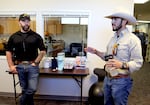Pacific County Sheriff Daniel Garcia kept his eyes on the road, behind a pair of sunglasses and under the brim of a Stetson hat.
It was mid-August and he was leading a caravan of deputies north on Washington’s breezy Long Beach peninsula. Passing by his car window was a coastal county mixed with mobile homes and vacation homes and farms for cattle and oysters.
Their target that moment was a woman accused of trying to kidnap a neighbor’s infant son. Garcia was driving to take part in breaching her home, guns drawn, to take her into custody. Ammo clips clung to his bullet proof vest and a handgun was holstered on his hip. A rifle sat in the backseat.
Garcia is not a certified police officer. Instead, he is the rare case of an elected sheriff who has never been a police officer or sheriff’s deputy before winning office at the ballot box. At the time of the raid, he was three days away from starting courses at the state’s police academy.

Pacific County Sheriff Daniel Garcia pictured at the county offices in Long Beach, Wash., on Sept. 15. Garcia has clashed with other elected officials during his nine months on the job.
Troy Brynelson / OPB
Sheriffs have the power to go on raids and help make arrests even without formal training, Garcia argued. The only people who can tell him otherwise are the voters.
“The fact that I am an elected sheriff closes the door on ‘Well, you’re not a certified peace officer,’” Garcia told OPB. “I am the sheriff. The people gave me that authority. Period.”
Garcia has flexed his authority as sheriff repeatedly in his short time. Doing so has put him at odds with both other county officials and the local newspaper closely watching his tenure.
Resting a hand on the steering wheel, Garcia acknowledged the criticism but defended his actions. He sees it as operating within his authority.
“I’m unwilling to allow my guys to come over here, one less body, and be in a higher level of danger,” Garcia said. “I’m just unwilling to. And I think the people of Pacific County put me in this position to make that call.”
Warrant execution
Garcia, at a glance, could be mistaken for a rancher. His tone is slow and stoic, bordering on hoarse. His eyes are sunken when they aren’t fenced behind sunglasses and his wide, spotless brim.
But he loosened up over several hours that day, particularly during the planned arrest. After parking his squad car, he swaggered over to his deputies on scene with his rifle slung over his shoulder.
His role was to be backup. He and three deputies game-planned that they would move in a formation known as a stack as they traveled through the house. They had reminded each other earlier, repeatedly, to stay calm and patient.

Pacific County Sheriff Daniel Garcia pictured, right, at the county offices in Long Beach, Wash., on Sept. 15.
Troy Brynelson / OPB
Garcia was to be the “second lethal” in the stack. That meant he would open fire on the woman if somehow the situation turned catastrophic.
“Let’s say she would have started opening fire on us,” Garcia said later. “If the first deputy that was primary lethal, if he would have been killed, it would have been up to me to stop her.”
Though he had never done policework, he said he spent two decades in the U.S. Navy, working posts like armed security for docked vessels at Middle Eastern ports. At one point, he said, he helped maintain weapons and technology for the Navy SEALs.
That was before he barnstormed the sheriff’s office. It was late summer 2022 when he launched his write-in campaign. He won in the fall by almost 1,500 votes.
The sheriff he unseated, Robin Souvenir, had faced multiple scandals in his lone term. One example: Souvenir gave his wife’s brother a leadership post despite internal protests and a history of allegations of workplace harassment.
Souvenir also didn’t meet Garcia’s ideal of a sheriff: Someone who’s seen all over town and ever availing themselves to the public.
“Some of the people in the community say it’s about time the sheriff is out doing things,” Garcia said.
Garcia started taking action shortly after he prevailed at the ballot. He sought to make the office his own. And, to show for it, he quickly found himself sparring with the county’s other elected officials.
Even before Garcia took office, he filed paperwork requesting the county spend $32,000 on 17 new rifles for the sheriff’s agency. The Board of County Commissioners bristled at the irregular approach; they pointed out Souvenir still held the office.
Once Garcia was sworn in, he battled the board over pay for his newly installed command staff. Commissioners kiboshed it over fears the sheriff was spending his budget too rapidly.
They butted heads in the spring, too, after Garcia was heard referring to himself at meetings as the “CEO of Pacific County,” which commissioners publicly rebut. Washington law describes sheriffs as chief executives, but most interpret that to mean running their own departments — not the entire county government.
“It has been different,” Commissioner Lisa Olsen said of the board’s relationship with Garcia. “The sheriff doesn’t understand the dynamic of county government. And didn’t really want to seem to learn it right away.”
The friction has been so tense that commissioners believe Garcia is on a path to getting sued. The three commissioners recently urged him to hire an outside attorney solely for his office. The pool of Washington counties who share liability insurance offered to pay.
“As elected officials, we must refrain from actions that might result in litigation against the county, which may result in decreased services to our citizens,” the commissioners wrote Aug. 8.
Police and politics
A sheriff is inherently as much a politician as it is a peace officer.
Unlike an appointed police chief — who shares a sheriff’s responsibility to oversee a department, set policy, balance a budget and talk regularly with department heads — elected sheriffs must have a direct line to the voting public.
“They have to report to the citizens of the county that elected him, all the citizens whether they voted for him or not,” said John Urquhart, a former King County sheriff.
That may be especially true in Washington state where sheriff races are partisan. Garcia ran as a Republican. He described an uneasiness on the campaign trail when he suddenly had to broadcast his private political views.
He described his views as “fundamental.” Americans’ rights come from God, he said, and a basic reading of the Constitution trumps state laws.
“I’m a very fundamental person, and from my outlook things are very clear,” he said. “I’m trying to bring us all together. And the thing that binds us all as Americans is our founding documents.”

Pacific County's administration offices in Long Beach, Wash., pictured on Sept. 15. Sheriff Daniel Garcia won election in the county last fall as a write-in candidate with no official law enforcement experience.
Troy Brynelson / OPB
Garcia views the sheriff as accountable to almost nobody but the voters. Most of the spats with county commissioners are rooted in a disagreement over how much authority Garcia wields. His statements about being chief executive arrived as other sheriffs in the country argue that they have more power than previously thought.
Similar ideas have come from the Constitutional Sheriffs and Peace Officers Association. The group believes sheriffs have the authority to ignore laws they deem unconstitutional. Such sheriffs in Washington state, including nearby Klickitat County Sheriff Bob Songer, have at times said they wouldn’t enforce gun restrictions.
Related: In Washington, right-wing sheriff candidates believe their power exceeds the federal government
Garcia didn’t want to be described as a constitutional sheriff, but expressed a similar outlook. State laws, he said, “do not get to contradict the brushstrokes of the United States Constitution.”
“The verbiage goes something to effect of: Anything repugnant to the Constitution is null and void, meaning it does not carry the weight of law,” Garcia said.
When asked if he’s run into any such laws in his first eight months on the job, Garcia said no.
“We haven’t run into that situation yet,” he said. He added he didn’t want to go down a road of “hypotheticals.”
In July, Garcia and a few on-duty deputies attended a meeting with the John Birch Society, a far-right group with a longstanding tradition of anti-federalist and anti-communist political organizing. A department spokesperson denied any officers were on-duty.
That meeting was reported by The Chinook Observer newspaper, which published many stories about Garcia’s relationship with county commissioners over the summer.
The paper has recently found itself at odds with the sheriff’s office. In early August, the sheriff’s office publicly cut off communication with the newspaper with a message on social media saying its team would no longer work with The Chinook Observer reporters going forward.
“The inability to find common ground and maintain a professional rapport with the Chinook Observer has regrettably led us to this point,” the post read.

A ballot box pictured outside Pacific County's administration offices in Long Beach, Wash., on Sept. 15. Sheriff Daniel Garcia won reelection here last fall as a write-in candidate.
Troy Brynelson / OPB
Editor Matt Winters said in an interview that he was caught off guard by the statement. Past sheriffs have been subjected to unflattering reports, too, but have always made efforts to talk and work out their concerns.
“Every single one of them would get extremely irritated at me, but then they would come in and we’d have a cup of coffee and usually come to an amicable conclusion that satisfied both parties,” Winters said.
Winters stood by the reporting. He said the paper didn’t set out to embarrass the sheriff’s office, rather reporters reacted to and reported on events as they occurred including positive coverage.
When asked about his icy relationship with the paper, Garcia said his issue wasn’t necessarily the reporting but rather the short deadlines to provide comment or answer questions.
Winters said he could count at least 10 instances where requests for comment went unanswered.
Scope of authority
As Garcia and company prepared for the raid, they armed themselves. The woman in the house had a gun, court documents said. The deputies grabbed their long guns. Garcia, his rifle.
What the sheriff left on his backseat that day were a pair of practice pistols, made of blue plastic. In just days he would attend Washington’s police academy, which uses the pistols to train recruits.
“They don’t allow you real weapons except for when you are in the range,” Garcia said.
Basic law enforcement training is required for all peace officers in the state. Untrained police and deputies aren’t supposed to conduct traffic stops or even put handcuffs on a person until they go through the process.
Washington law doesn’t prohibit other duties, like interviewing people and writing reports. It’s not unheard of for civilian employees at police departments to do that work, according to Urquhart, the former sheriff.
“I don’t think there’s any problem with (some duties),” Urquhart said. “But the reality is, you cannot take any police steps if you’re not a certified police officer.”
Urquhart, who is now retired and volunteers as a law enforcement consultant, declined to comment directly on Garcia’s practice of helping execute search warrants. He said he wouldn’t have been happy to hear about that in his own office.
“I would be very, very careful about inserting myself in a situation like that,” Urquhart said.
It’s a legal gray area, according to Bill Bailey, an associate law professor at the University of Washington who has been both a prosecutor and defense counsel in trials spanning four decades.
Bailey had never seen a situation like Garcia’s. Law enforcement is rife with military veterans, he said, but the skills and training aren’t identical.
“Just hearing the description of this — what he’s doing, carrying weapons, untrained — it raises the hair on the back of my neck,” Bailey said. “It’s just very unwise.”
Garcia was aware he may raise eyebrows. Mostly, he said, he has gone on less risky calls. He said he does welfare checks most frequently. He pointed out that, on search warrants, he’s not the one “kicking in the door.”
“In fact, I’ve been told a couple of times that I help situations out because they’re able to speak with the citizen and tell them the sheriff is right here and we’re here to help,” Garcia said.
Garcia again noted he was acting within his authority. The academy can’t tell him what to do, he said, it’s merely a diploma to show he knows state laws.
“In my understanding of our state’s constitution, I have the authority. What I’m getting from the state is certification that I’m up to snuff on current and applicable laws,” he said.
At the woman’s mobile home, the deputies’ arsenal became little more than extra weight. They disappeared into the home, then resurfaced with her in handcuffs.
The woman fought somewhat, Garcia later noted, but the deputies didn’t need to shoot their guns. He attributed that outcome to the show of force itself.
“She just realized the gig was up,” he said. “It seems to be a consistent thing with most people. I don’t think lots of people plan or want to get into a shootout with us.”